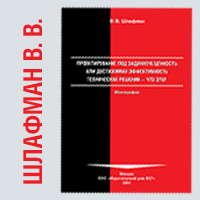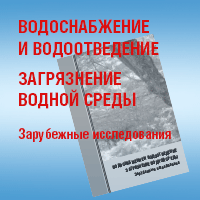№12|2017
WASTEWATER TREATMENT
bbk 000000
UDC 628.35:661.5
Nitrogen removal in a circulation oxidation ditch model
under the conditions of lowered concentration of organics in wastewater
Summary
The summarized results of the third stage of an integrated study of energy efficient processes of wastewater treatment in circulation oxidation ditches are presented. The experiment was carried out in a laboratory model of a circulation oxidation ditch with horizontal directional flow of mixed liquor. The impact of low concentration of dissolved oxygen in the bioreactor volume (at 0.5 mg/l level) and low concentration of organic pollutants in the incoming model wastewater on the treatment efficiency and biomass stability was studied. The highest efficiency of total nitrogen removal was reached at the specific organics load on activated sludge (BOD) R = 0.07 g/(g∙day), average dissolved oxygen concentration 0.5 mg/l and 7.5 hours aeration time. At that the concentration of ammonium nitrogen in the effluent was about 0.6 mg/l; the concentration of nitrate nitrogen was 9.6 mg/l. The operation of the bioreactor at lowered dissolved oxygen concentrations resulted in partial biomass bulking. The sedimentation properties of activated sludge changed; however stayed at satisfactory level.
Key words
wastewater , nitrification , energy efficiency , activated sludge , denitrification , circulation oxidation ditch , biological removal of nitrogen
The further text is accessible on a paid subscription.
For authorisation enter the login/password.
Or subscribe
REFERENCES
- Zhou X., Han Y., Guo H. Identication and evaluation of SND in a full-scale oxidation ditch system under different aeration modes. Chemical Engineering Journal, 2015, v. 259, pp. 715–723.
- Sun S.-P., Pellicer i Nacher C., Merkey B., Zhou Q., Xia S.-Q., Yang D.-H., Sun J.-H., Smets B. F. Effective biological nitrogen removal treatment processes for domestic wastewaters with low C/N ratios: A review. Environmental Engineering Science, 2010, v. 27, no. 2, pp. 111–126.
- Jimenez J., Bott C., Regimi P., Rieger L. Process control strategies for simultaneous nitrogen removal systems. Proceedings of the Water Environment Federation, 2013, v. 4, pp. 492–505.
- Bertanza G. Simultaneous nitrification-denitrification process in extended aeration plants: pilot and real scale experiments. Water Science and Technology, 1998, v. 35, no. 6, pp. 53–61.
- Liu Y., Shi H., Xia L., Shi H., Shen T., Wanga Z., Wangb G., Wang Y. Study of operational conditions of simultaneous nitrification and denitrification in a carrousel oxidation ditch for domestic wastewater treatment. Bioresource Technology, 2010, v. 101, pp. 901–906.
- Fitzgerald C. M., Camejo P., Oshlag J. Z., Noguera D. R. Ammonia-oxidizing microbial communities in reactors with efficient nitrification at low-dissolved oxygen. Water Research, 2015, v. 70, pp. 38–51.
- Zhang P., Zhou Q. Simultaneous nitrification and denitrification in activated sludge system under low oxygen concentration. Frontiers of Environmental Science & Engineering in China, 2010, v. 1, no. 1, pp. 49–52.
- Gogina E., Gulshin I. Simultaneous denitrification and nitrification in the lab-scale oxidation ditch with low C/N ratio. Procedia Engineering, 2015, v. 117, pp. 107–113.
- Gogina E. S., Gul’shin I. A. [Simulation of energy efficient process of biological wastewater treatment in a circulation oxidation ditch]. Vodosnabzhenie i Sanitarnaia Tekhnika, 2016, no. 9, pp. 42–48. (In Russian).
- Van Loosdrecht M. C., Nielsen P. H., Lopez-Vazquez C. M., Brdjanovic D. (Editors). Experimental methods in wastewater treatment. IWA Publishing, 2016, v. 15.






